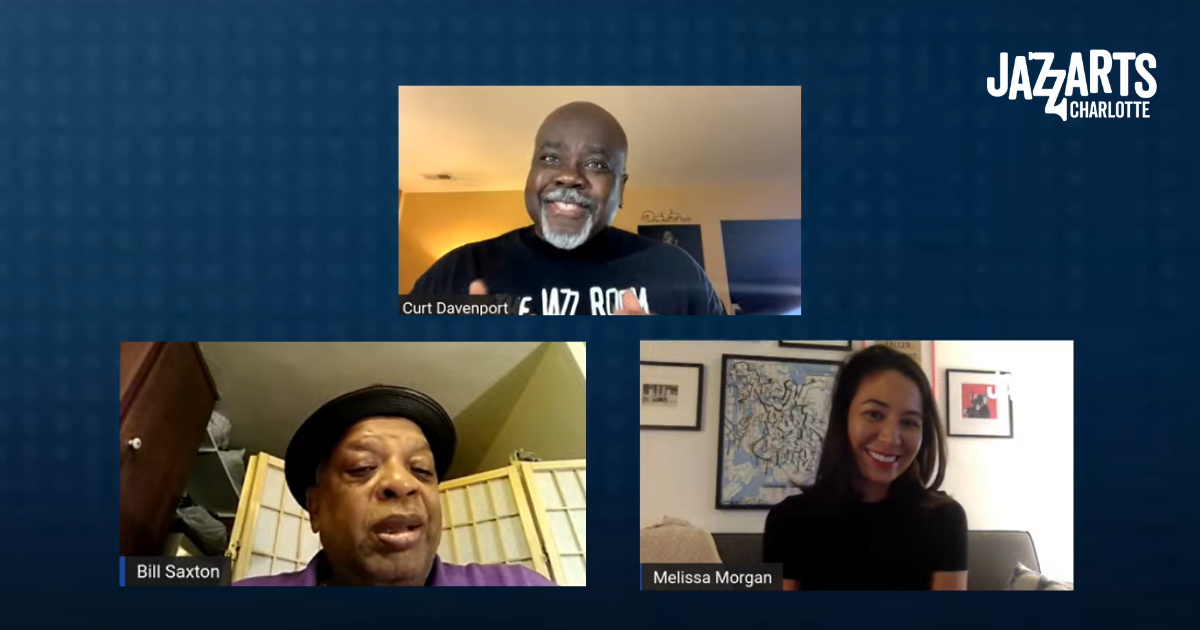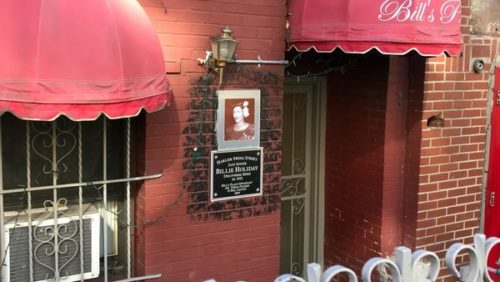
The Impact of Lady Day, Billie Holiday
Billie Holiday had a short but action-packed life, often sensationalized in movies that focus on the drama rather than the impact of her music. In preparation for the Billie Holiday JAZZ ROOM tribute, we spoke with vocalist Melissa Morgan and Harlem Legend Bill Saxton about the amazing “Lady Day”.
Here are a few excerpts edited from the conversation. Enjoy the entire discussion any time on YouTube.
CURTIS: Bill, born in Harlem and now the owner of Bill’s Place, you’re in a unique position to help us understand what brought Billie to Swing Street.
BILL: Everybody came to Swing Street. In the 1920s, it had more speakeasies than any single street in the whole state of New York. With segregation, black musicians were limited, so Swing Street was that place.
A 16 year old girl, Eleanora Fagan, went to speakeasies to sit in and sing. Young, pretty and tall, she would sing, people would throw tips and she would make a little money – it was a hustle. One such club was Monette’s Supper Club. Monette Moore, the owner and a famous singer at the Harlem Opera House, often entertained at her club. One night, Monet was particularly busy with her guests and told the girl to go sing. John Hammond, famous for recording black musicians (on what are called the race records) was there. He was always looking for talent, and was captivated with her voice. He didn’t expect what he found that night, became her manager, introduced her to Benny Goodman, and, with the name pseudonym Billie Holiday, the rest is history.
It all happened at Monette’s Supper Club, now Bill’s Place. When I bought the place, I didn’t even know that story.
CURTIS: Melissa, as a vocalist, how were you influenced by Billie Holiday?
MELISSA: I didn’t realize I was as influenced as I was. What sets her apart for me is she’s a storyteller, not performer. When she sings a song, you feel her pain, her story, her journey. That’s difficult to do.
Her timing and phrasing for sure. You’ve got certain singers who are on top of the beat, Billie is way back, and yet still right on time. Unconsciously that’s where my time sits too. When I’m looking for a bass player I make sure his time is right back there.
It wasn’t until I had an older musician mentioned “your phrasing sits back like Billie”. Whenever anyone would ask me about my influences I would say Nancy Wilson, Etta Jones. But when I think about what brought me to this music, Billie brought me home. Once I heard her, I felt like I had landed. I had a warm blanket, a friend, someone who understood me. I understood what It means to see and hear someone speak their truth and not feel shamed for it.
CURTIS: Billie Holiday has been the subject of several films, like “Lady Sings the Blues” and most recently “The United States vs. Billie Holiday” , centered around “Strange Fruit”, her song about lynching. They tend to give a sordid picture of Billie Holiday. Bill, you are familiar with Harlem and the jazz scene of the time. What should we know that these films don’t tell us.
BILL: Billie Holiday was vulnerable and lived that through her music. This is why the music is so powerful. The conditions of slavery are what brought her situation to the forefront. After prohibition ended and alcohol was legal, the lawyers needed a new focus, and picked musicians. Billie’s voice had a reputation so that made her a prime target. People talk about her drug addiction. But the same people who arrested her for having it, sold it to her. They say somebody brought drugs to the hospital when she was on her dying bed. You know it wasn’t one of the cats.
CURTIS: Melissa, Billie Holiday’s catalog is vast, and there are so many selections you could have chosen. How do you decide what to sing?
MELISSA: My tune selection is visceral. Yes or no, it’s how it hits me. Lyrics are important. I definitely highlight some of the big Billie songs, like Body and Soul, Willow Weep for Me, and then we want to round the set out, so some swingers in there as well. All of Me was a great tune for her, and Blue Skies. I want to make sure we have diversity in tempos and rhythms and styles. I could do that slow swing all day long. It makes me happy; I will never tire of it. But I aim to give the audience a full anthology in as little time as we have, the highlights of her, and also the style of her.
I would never come in and try to impersonate Billie Holiday. I believe next weekend is a time where we get to celebrate her and honor her. I think the biggest part of doing so is to be me. That was one of the things that sets her apart from any singer performer ever. Because she never put on a face. She was just herself. It’s such an example for anyone. It’s way more difficult than we give you credit for to be yourself while you are being watched and judged and on display and vulnerable. There is a bravery required to be that honest.
More on our Guests
Meet us in the JAZZ ROOM for Melissa Morgan sings Billie Holiday, next week, October 15 & 16.
Grab Melissa Morgan’s album “Until I Met You”. Then follow her on Instagram @melissamorganjazz so you can catch her next performance or next album which is in the works.
Bill’s Place, the only remaining Harlem speakeasy from that era, is open every Friday and Saturday.
Enjoy this Spotify playlist of a mix of Melissa and Billie in preparation for JAZZ ROOM.

Thank you to our sponsors, Knight Foundation, Infusion Fund, NC Arts Council, Doris Duke Foundation and our many donors who keep jazz thriving.